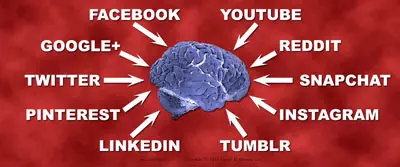Social Media And The Brain, Pulling People’s Triggers
Many forces influence people. Social media is a big one. Tech firms work hard to keep people on it. To do this they’ve looked at how social media and the brain bond. That means they’ve learned how to pull people’s emotional triggers.
Pulling People’s Three Emotional Triggers
People have three emotional triggers. Pulling them causes their most primitive emotions to take charge:

Tech firms have spent much time, money and effort understanding the bond between social media and the brain.
People want to feel secure, new and special. Thus, things that satisfy these feelings will attract them. For instance, buying a big car can make them feel safer. Buying something new can refresh their lives. Finally, buying something unique can help them feel special.
Social media taps all three. First, it connects people of like minds. There’s strength in numbers. There’s also safety. People can feel safe in their own digital world.
Second, there is always a new post. There’s always a new message, a new contact, a new posts. Social media is always refreshing. It’s refreshing people’s lives.
Third, by posting stuff, people say, “Here I am.” What they share says who they are. Moreover, the feedback in likes, shares and comments serve to recognize emotionally. People are noticing that one exists.
Bonding Social Media And The Brain
Once social media pulls these triggers, the challenge becomes how to bond social media and the brain in way that makes money?
First, social media works that bond to attract and retain people’s attention. Their brains are the social media’s battleground. They all fight on it.
Second, it works that bond to get people to interact with it. This gets them to give up data on themselves.
Yet, none of this would be worth much if people did not push stuff on each other by sending, passing and re-passing it. In the jargon of social media, this is sharing.
This sharing does not cost anything though. No one gives anything up. Nothing is divided. Thus, the real transformative event of social media has been selling people on the idea that bragging and pushing stuff to others is sharing.
In this way then, by pulling people’s emotional triggers and selling them on a new meaning of sharing, social media can tap the narcissist and exhibitionist in people without them knowing it.
People think they’re sharers. In reality, they’re pushers.


